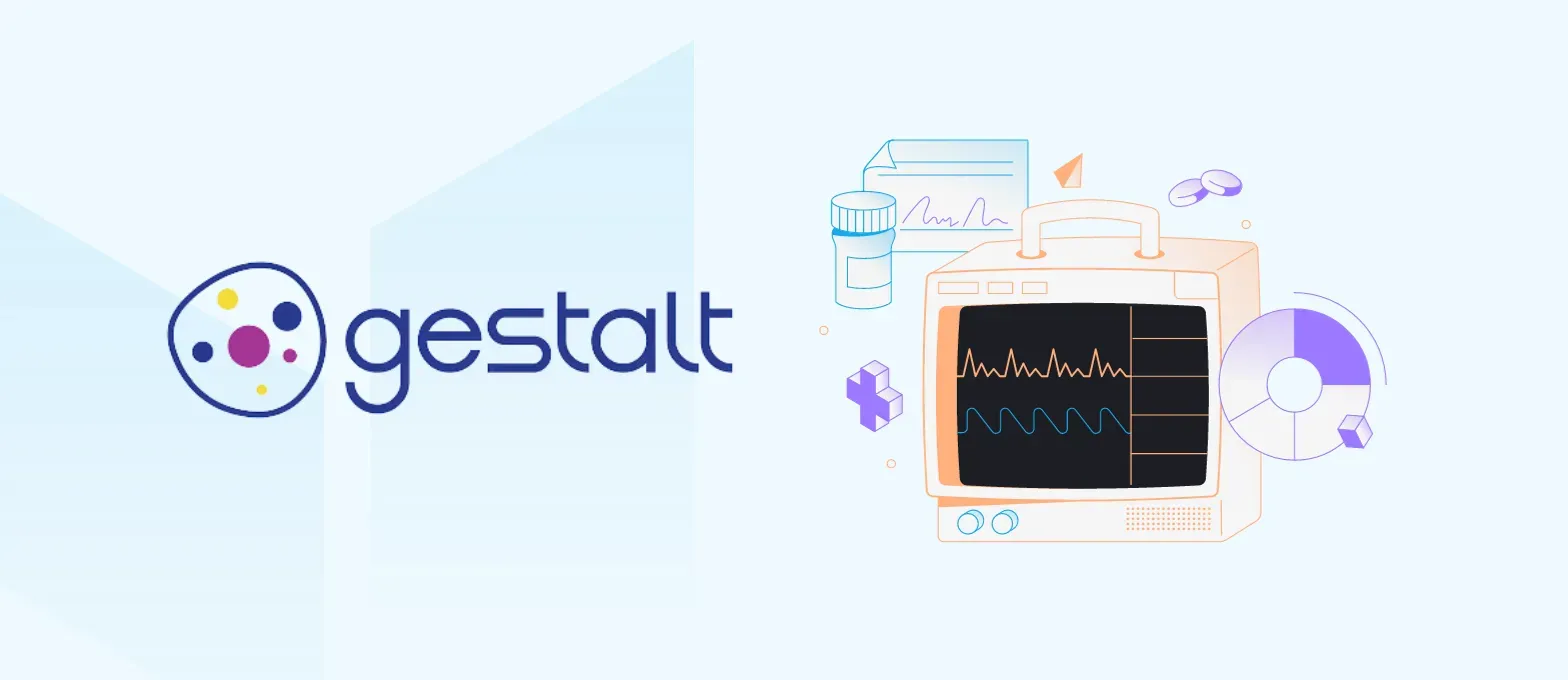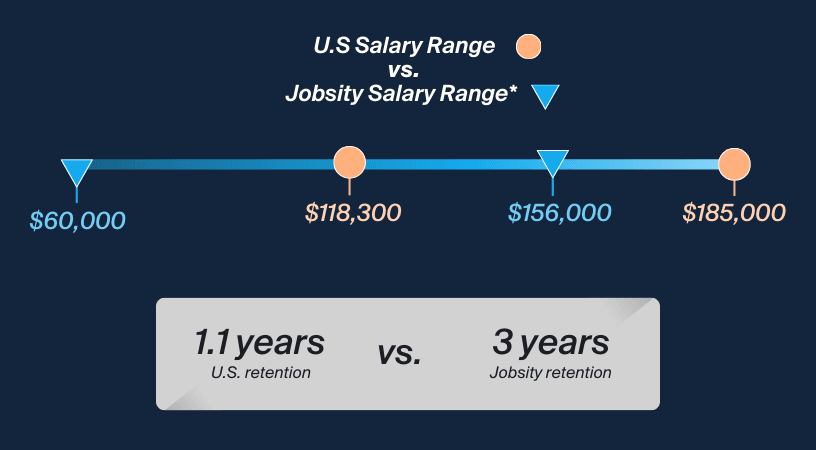Client Spotlight: How Gestalt Diagnostics Uses AI to Revolutionize HealthTech

The AI industry is forecasted to grow by 37% per year, every year from 2022-2030. This means a jump in market value from $15.1 billion to $187.5 billion in only eight years. With such extraordinary growth comes opportunity—and software teams have plenty of opportunities to take advantage of.
The future of AI in healthcare is clear: it’s reshaping how we approach patient pathways, from onset to outcomes.
Diagnostics is one field where AI plays the most vital role of all. New models, including machine and deep learning, are being trained to recognize, collect, and analyze disease markers at inhuman speeds. These AI–based techniques help identify cancers and other conditions using patient scans and labs.
This cutting-edge technology promises to redefine the way we approach cancer detection. Software developers integrate AI into the diagnostic process to enhance accuracy and efficiency, and it ultimately saves lives.
Jobsity client Gestalt Diagnostics is no stranger to innovation. With a lineup of products supporting healthcare professionals, incorporating AI is just the next step. The company is quickly becoming a leading force in modern cancer diagnosis and the AI revolution.
AI at Work: Gestalt Diagnostics
Gestalt uses machine learning applications to increase the speed and accuracy of pathology processes. Their premier product, PathFlow, provides a universal digital platform for pathologists and laboratories.
PathFlow uses AI and machine learning to analyze scans and slides, highlighting regions of interest. PathFlow also has the capability to score and grade tumors. The tool not only recognizes new factors, but provides quality control to older cases—ensuring that nothing’s missed.
This is another case where healthcare AI data collection and identification shine. PathFlow allows users to automatically categorize data and toggle between views to compare and contrast. Specialists can more easily make connections between two data points without having to sort through images or readings by hand.
According to Gestalt, over 90,000 cancer cases have been diagnosed using PathFlow. AI had a hand in more than 5% of those diagnoses. That means AI has helped detect cancer in 4,500 patients, saving thousands of lives.
ButAI applications aren’t only for the users: software developers improving the technology also find AI helpful in their work. Jobsity QA Josué describes it as a “game changer,” particularly in Quality Assurance. Automation drastically reduces the time it takes to achieve meaningful test case results. By automating tedious, repetitive, manual tasks, developers can give their time to more pressing matters.
When it comes to cancer diagnosis, every second counts. AI diagnostics save that precious time, allowing for quicker identification and better patient outcomes.
Jobsity In Action: Josue Parra
Josué, one of Jobsity’s senior QA engineers, has been working with Gestalt for almost two years. He’s played a vital role in developing their automated solutions. Josué’s work on diagnostic interoperability and automation in healthcare support Gestalt’s daily functions. He also develops test cases for API security.
Jobsity developers on the PathFlow project continually add new features and AI models. Josué’s role involves using JavaScript to test PathFlow’s automations and Postman for APIs.
Josué primarily conducts regression tests, which ensure that new updates and features don’t disrupt PathFlow’s functionality. AI tools have significantly accelerated tasks like detecting UX differences between software versions, which helps reduce testing time.
Josué’s degree in system engineering and product development provided a strong foundation for his work. His extensive hands-on experience enabled him to become a Lead QA Engineer. Over two years, his work has helped propel Gestalt to a top position in HealthTech diagnostics.
Software Development Roles in AI x Diagnostics
Several key roles are crucial when building an AI-based diagnostic platform:
- Machine Learning Engineers: Machine learning engineers focus on creating and using algorithms and models for machine learning, which enables AI applications. They handle tasks including data preparation, training models, and working toward better accuracy and performance. This is crucial for making a functional AI program.

- Artificial Intelligence Engineers: These engineers teach AI models by using the tools and information created by machine learning engineers. The two roles have significant overlap. AI engineers ensure that AI models can extrapolate from past data, make intelligent suggestions. They also help AI use language in a way that feels natural to humans. This is known as Natural Language Processing (NLP).
- Data Engineers: Data engineers handle the large amounts of information that AI models use. They make sure the data is organized and formatted in a way that can be easily analyzed. They standardize how the data is structured, scrub it, and prepare it for machine learning algorithms. Data engineers also create and maintain databases and the supporting infrastructure.
- Software Integration Engineers: Software integration engineers combine different external software to work together on devices or platforms. This allows multiple systems to communicate, so a single platform or application can gather data from various sources. AI then uses this data to generate personalized suggestions and responses.
- Quality Assurance Engineers: Quality assurance engineers, often called QAs, check to make sure products or applications are reliable and high-quality. They confirm that the product or software meets the set requirements and that it works correctly before opening access to users.
*Salary/retention data sourced from LinkedIn Talent Insights.
Finding the Right AI Specialists for Your Team
When building platforms, systems, and apps to make waves in the HealthTech industry, time is of the essence.
That’s where Jobsity comes in.
Jobsity is effective, convenient, and affordable. We handpick hires who directly align with your goals, save you up to 40% on hiring, and provide a risk-free trial to ensure a great fit.
Our AI specialists make development and integration a breeze. Jobsity engineers have years of proven experience in Java, Python, and any other languages you use. And they’ll get along great with your in-house team! Jobsitizens are communicative go-getters with a passion for technology and critical thinking. Any Jobsity candidate you hire will work in your own time zone (or close to it), making collaboration easy.
Now is the perfect time to develop your product, grow your business, and make an impact in the healthcare revolution. Book a call to get started today!
Donna Kmetz is a business writer with a background in Healthcare, Education, and Linguistics. Her work has included SEO optimization for diverse industries, specialty course creation, and RFP/grant development. Donna is currently the Staff Writer at Jobsity, where she creates compelling content to educate readers and drive the company brand.
